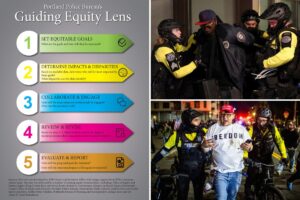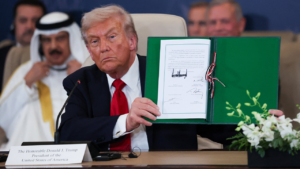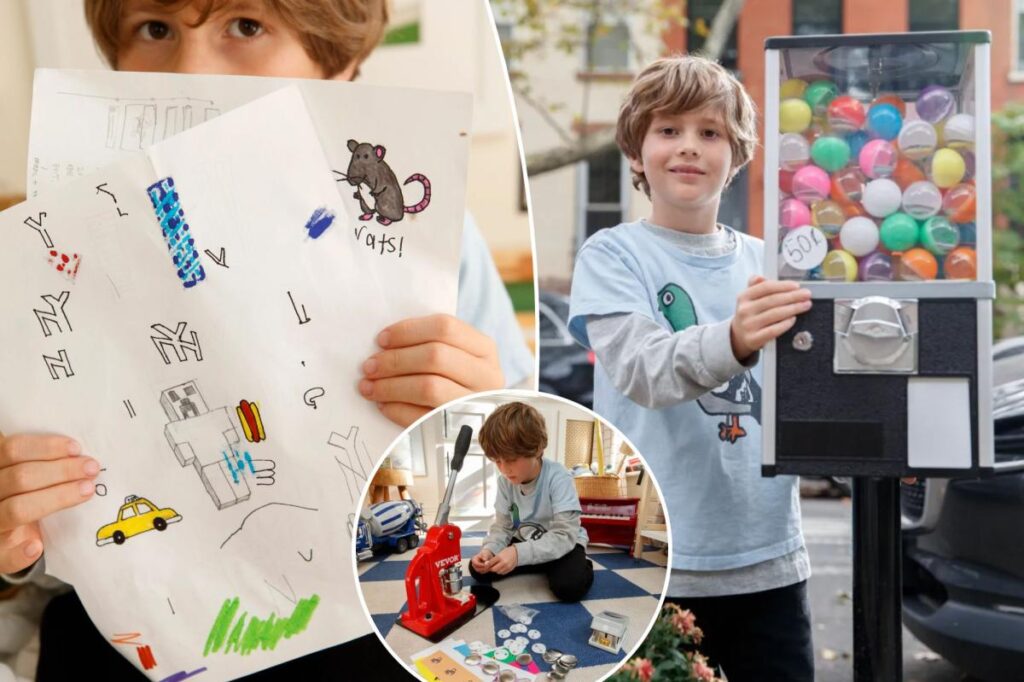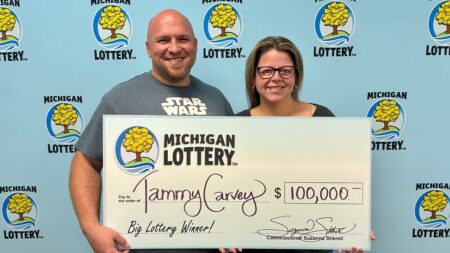He‚Äôs the new vending machine king of Brooklyn ‚Äî¬Ýand Linus Piepmeyer hasn‚Äôt even finished the third grade.
What began as a lesson about the value of money ‚Äî¬Ýand savings ‚Äî¬Ýhas become a minor sensation on one block in Boerum Hill, where the 8-year-old boy with an artist‚Äôs eye has been hawking homemade Big Apple-themed buttons out of a gumball dispenser his dad snapped up on a whim.
With his parents‚Äô help, Piepmeyer spends his weekends cranking out his so-New York designs ‚Äî from pigeons to pizza slices, to taxis, hot dogs and rats ‚Äî¬Ýpackaging them in brightly-colored plastic capsules and hoping that passers-by will shell out two quarters a pop.
So far, so good ‚Äî¬Ýsince hanging out his shingle on Wyckoff Street in July, the school kid has sold hundreds of pins.
“We’ve run out of room in his piggy bank from all the quarters,” mom Alison, 39, told The Post with a laugh.
“Getting the money has been cool,” Linus told The Post, though he confessed right up front that when he heard about the idea, he had something slightly different in mind. “I was hoping it could be a snack machine that we could fill with Cheetos or Twizzlers.”
“During one conversation, the vending machine came up and it seemed like a tangible way to showcase how creative ideas and hard work can make money,” said Alison, founder of @Seen, a social media company, and the former chief marketing officer at Color Factory, the interactive art exhibition company.
It was also the perfect project for Linus, who’s got a clear creative streak, his parents said.
“Linus is always drawing stuff — he loves making comic books,” said dad Zach, 39, co-founder of Magical, an AI platform company.
‚ÄúWhen we talked to him about chores, we thought, ‚ÄòShould chores be for money ‚Äî or do you do them because you‚Äôre part of this family?’‚Äù he recalled to The Post.
‚ÄúWe decided maybe it‚Äôs better for Linus to feel like he‚Äôs making something ‚Äî¬Ýand that this will teach him the idea of creating value that other people want to pay for. That was the bigger idea,‚Äù he explained.
Nine months ago, Zach bought the vending machine on Amazon and placed it outside their home, tucked into a line of restored, two-story Brownstone Brooklyn beauties.
Originally, the plan was to use it to showcase the work of local artists, who would make buttons showing their work, but that idea fell flat. So it stayed empty for a few months, which initially caused a minor commotion in the neighborhood.
This also proved to be an important life lesson for the elementary school student.
“It got snowed on, someone did graffiti on it, it got hit with a baseball bat, and someone punched a hole in it, so we had to replace the glass,” Linus said.
In addition, some neighbors weren’t shy about asking exactly what was going on with this glass box on a black stand bolted to a heavy planter using a large bike lock.
“For a while it was languishing, and people were, like, ‘Could we move this?’” said Zach. “It was this empty, weird thing sitting outside on the sidewalk in front of our house.”
But then, Linus struck a deal with his parents to put his drawing skills to use.
Creating the pins is a whole process. First, the icons are created in the design program Canva, before being color printed at a nearby print shop and punched out to create buttons, using a Vevor machine the couple had on hand (they’ve been making buttons for birthday parties for years).
In addition to creating the artwork, Linus is in charge of marketing ‚Äî¬Ýanother valuable exercise, his parents said.
“When we put up signs or market the machine in chalk on the sidewalk, we’ll see a direct correlation with more sales,” Alison said. “That was a fun thing to explain to Linus — and show him firsthand.”
Cathy Meier, a creative arts therapist who lives across the street, said it’s been so fun watching people gather around the machine.
“I’ll be having breakfast and notice all these people coming by and stopping, looking and figuring it out,” she said. “It’s very community building.”
What Meier appreciates most about this street project is that the pins depict the best of New York City, all from a child’s perspective.
“There’s something so innocent about this,” she said. “It’s such a creative idea, and it gives you all the warm and fuzzy feelings. It’s taking a piece of art and sharing it. It’s a cool thing.”
The kids on the block get a kick out of it, too. Some have even encouraged Linus to add new designs, which would incentivize repeat buyers or, perhaps, add a rare pin to the inventory.
“So many of the kids in the neighborhood have been asking Linus to make super rare ones — they’re obsessed with that — just like they are about Pokemon cards,” Zach said.
No matter what‚Äôs in the machine, just the idea of seeing a toy vending machine on a random leafy Brooklyn street seems to lead kids ‚Äî¬Ýand their parents ‚Äî to return and check it out.
“It’s, like, ‘What did they do this week, did they change the pins or are they doing something different?’” Meier said. “It gets people talking.”
And just in case anyone is short on change, the Piepmeyers always keep extra quarters on hand for anyone who wants a pin.
“I keep a bunch of quarters by the front door,” Zach said. “If I see some little kids who want one of the pins, I’ll run out there and give them the change. When I do that, their faces light up.”
After shelling out startup costs for the vending machine (about $230), a button maker ($120), circle punch ($15) and other miscellaneous expenses, Alison said that ‚Äúat this point, we‚Äôve broken even, but it‚Äôs not really about that. More about having fun, doing something exciting for the community, and teaching our kids new skills,‚Äù she told The Post.¬Ý
Of course, she did confess that it may not be the most sensible venture in the long run.
‚ÄúIt‚Äôs not really a viable business model,‚Äù she¬Ýadded with a laugh ‚Äî but that‚Äôs not stopping the entrepreneurial family.
As for their next plans, which also includes Linus‚Äô 3-year-old sister Georgie, more pin designs are in the works along with a brand extension:¬Ýbuyers will now find a QR code printed on a card placed inside each capsule, directing them to a site, Inside Joke Apparel, where they can buy T-shirts sporting one of Linus‚Äô designs.
But the youngster isn’t even close to finished building his empire, he said.
“I’m also going to start a comic book company with my friend,” he said.
When asked what he wants to be when he grows up, he didn’t miss a beat.
“I want to be a virtual reality headset maker. Then I’ll be able to get them for free.”
Spoken like a true entrepreneur.
Read the full article here













